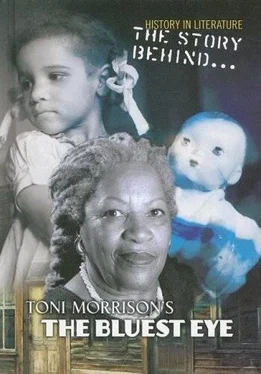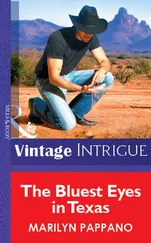"Don't worry none, baby."
"You gonna make another pie?"
"'Course I will."
"Who were they, Polly?"
"Hush. Don't worry none," she whispered, and the honey in her words complemented the sundown spilling on the lake.
SEEMOTHERMOTHERISVERYNICEMOTHERWILLYOUPRA YWITHJANEMOTHERLAUGHSLAUGHMOTHERLAUGHLA The easiest thing to do would be to build a case out of her foot.
That is what she herself did. But to find out the truth about how dreams die, one should never take the word of the dreamer. The end of her lovely beginning was probably the cavity in one of her front teeth. She preferred, however, to think always of her foot.
Although she was the ninth of eleven children and lived on a ridge of red Alabama clay seven miles from the nearest road, the complete indifference with which a rusty nail was met when it punched clear through her foot during her second year of life saved Pauline Williams from total anonymity. The wound left her with a crooked, archless foot that flopped when she walked-not a limp that would have eventually twisted her spine, but a way of lifting the bad foot as though she were extracting it from little whirlpools that threatened to pull it under. Slight as it was, this deformity explained for her many things that would have been otherwise incomprehensible: why she alone of all the children had no nickname; why there were no funny jokes and anecdotes about funny things she had done; why no one ever remarked on her food preferences-no saving of the wing or neck for her-no cooking of the peas in a separate pot without rice because she did not like rice; why nobody teased her; why she never felt at home anywhere, or that she belonged anyplace. Her general feeling of separateness and unworthiness she blamed on her foot. Restricted, as a child, to this cocoon of her family's spinning, she cultivated quiet and private pleasures. She liked, most of all, to arrange things. To line things up in rows-jars on shelves at canning, peach pits on the step, sticks, stones, leaves-and the members of her family let these arrangements be. When by some accident somebody scattered her rows, they always stopped to retrieve them for her, and she was never angry, for it gave her a chance to rearrange them again. Whatever portable plurality she found, she organized into neat lines, according to their size, shape, or gradations of color. Just as she would never align a pine needle with the leaf of a cottonwood tree, she would never put the jars of tomatoes next to the green beans. During all of her four years of going to school, she was enchanted by numbers and depressed by words. She missed-without knowing what she missed-paints and crayons.
Near the beginning of World War I, the Williamses discovered, from returning neighbors and kin, the possibility of living better in another place. In shifts, lots, batches, mixed in with other families, they migrated, in six months and four journeys, to Kentucky, where there were mines and millwork.
"When all us left from dawn home and was waiting down by the depot for the truck, it was nighttime. June bugs was shooting everywhere. They lighted up a tree leaf, and I seen a streak of green every now and again. That was the last time I seen real June bugs. These things up here ain't June bugs. They's something else. Folks here call them fireflies. Down home they was different. But I recollect that streak of green. I recollect it well."
In Kentucky they lived in a real town, ten to fifteen houses on a single street, with water piped right into the kitchen. Ada and Fowler Williams found a five-room frame house for their family.
The yard was bounded by a once-white fence against which Pauline's mother planted flowers and within which they kept a few chickens. Some of her brothers joined the Army, one sister died, and two got married, increasing the living space and giving the entire Kentucky venture a feel of luxury. The relocation was especially comfortable to Pauline, who was old enough to leave school. Mrs. Williams got a job cleaning and cooking for a white minister on the other side of town, and Pauline, now the oldest girl at home, took over the care of the house. She kept the fence repair, pulling the pointed stakes erect, securing them with bits of wire, collected eggs, swept, cooked, washed, and minded the two younger children-a pair of twins called Chicken and Pie, who were still in school. She was not only good at housekeeping, she enjoyed it. After her parents left for work and the other children were at school or in mines, the house was quiet. The stillness and isolation both calmed and energized her. She could arrange and clean without interruption until two o'clock, when Chicken and Pie came home. When the war ended and the twins were ten years old, they too left school to work. Pauline was fifteen, still keeping house, but with less enthusiasm. Fantasies about men and love and touching were drawing her mind and hands away from her work. Changes in weather began to affect her, as did certain sights and sounds. These feelings translated themselves to her in extreme melancholy. She thought of the death of newborn things, lonely roads, and strangers who appear out of nowhere simply to hold one's hand, woods in which the sun was always setting. In church especially did these dreams grow. The songs caressed her, and while she tried to hold her mind on the wages of sin, her body trembled for redemption, salvation, a mysterious rebirth that would simply happen, with no effort on her part. In none of her fantasies was she ever aggressive; she was usually idling by the river bank, or gathering berries in a field when a someone appeared, with gentle and penetrating eyes, who-with no exchange of words-understood; and before whose glance her foot straightened and her eyes dropped. The someone had no face, no form, no voice, no odor. He was a simple Presence, an all-embracing tenderness with strength and a promise of rest. It did not matter that she had no idea of what to do or say to the Presence-after the wordless knowing and the soundless touching, her dreams disintegrated. But the Presence would know what to do.
She had only to lay her head on his chest and he would lead her away to the sea, to the city, to the woods… forever. There was a woman named Ivy who seemed to hold in her mouth all of the sounds of Pauline's soul. Standing a little apart from the choir, Ivy sang the dark sweetness that Pauline could not name; she the death-defying death that Pauline yearned for; she sang of the Stranger who knew…
Precious Lord take my hand
Lead me on, let me stand
I am tired, I am weak, I am worn.
Through the storms, through the night
Lead me on to the light
Take my hand, precious Lord, lead me on.
When my way grows drear
Precious Lord linger near,
When my life is almost gone
Hear my cry hear my call
Hold my hand lest I fall
Take my hand, precious Lord, lead me on.
Thus it was that when the Stranger, the someone, did appear out of nowhere, Pauline was grateful but not surprised. He came, strutting right out of a Kentucky sun on the hottest day of the year. He came big, he came strong, he came with yellow eyes, flaring nostrils, and he came with his own music. Pauline was leaning idly on the fence, her arms resting on the cross rail between the pickets. She had just put down some biscuit dough and was cleaning the flour from under her nails. Behind her at some distance she heard whistling. One of these rapid, high-note riffs that black boys make up as they go while sweeping, shoveling, or just walking along. A kind of city-street music where laughter belies anxiety, and joy is as short and straight as the blade of a pocketknife. She listened carefully to the music and let it pull her lips into a smile. The whistling got louder, and still she did not turn around, for she wanted it to last. While smiling to herself and holding fast to the break in somber thoughts, she felt something tickling her foot. She laughed aloud and turned to see. The whistler was bending down tickling her foot and kissing her leg. She could not stop her laughter-not until he looked up at her and she saw the Kentucky sun drenching the yellow, heavy-lidded eyes of Cholly Breedlove.
Читать дальше











